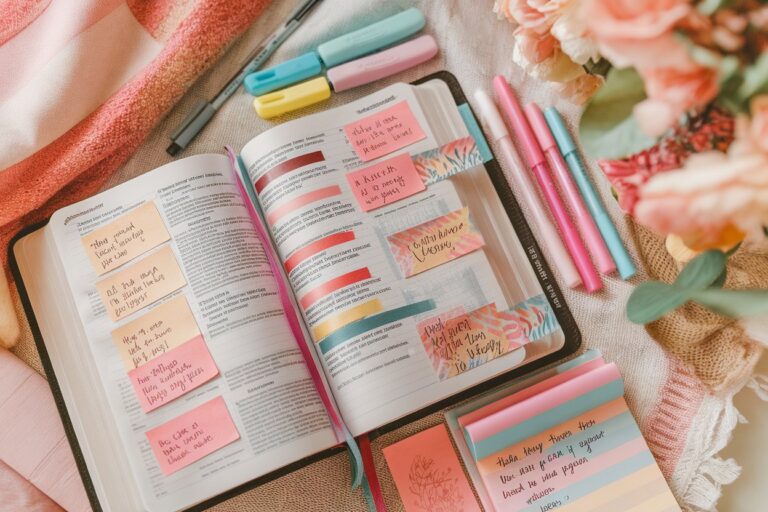Discover the powerful benefits of journaling for mental health, emotional regulation, and even physical wellbeing. Learn practical tips to start your journaling practice today.
Have you ever felt overwhelmed by swirling thoughts or emotions that just won’t quiet down? I’ve been there, too. A few years ago, during a particularly stressful period in my life, I found myself lying awake at 3 AM, my mind racing with worries and to-do lists. That’s when I reached for a notebook and pen on my nightstand and just started writing. Twenty minutes later, I felt a weight lift from my shoulders. That simple act of transferring my thoughts to paper became my gateway into the transformative world of journaling.
Journaling isn’t just a trendy self-care practice promoted by wellness influencers—it’s a powerful tool backed by science that can drastically improve your mental health, emotional well-being, and even physical health. Whether you’re scribbling thoughts in a leather-bound notebook or typing reflections into an app, the benefits of putting pen to paper (or fingers to keyboard) extend far beyond simple record-keeping.
In this comprehensive guide, I’ll share everything you need to know about the remarkable benefits of journaling, from stress reduction and anxiety management to enhanced creativity and improved physical health. I’ll also provide practical tips to help you establish a sustainable journaling practice that works for your lifestyle.
Table of Contents
- What Are the Main Benefits of Journaling?
- Mental Health Journaling Benefits: A Natural Antidote to Modern Stress
- Emotional Regulation Through Journaling: Become the Master of Your Feelings
- Cognitive Benefits of Journaling: Sharpen Your Mind Through Writing
- Self-Awareness Through Journaling: Know Thyself
- What Are the Benefits of Gratitude Journaling?
- Physical Health Benefits of Journaling: Writing for Wellness
- Goal Setting with Journals: From Dreams to Reality
- Getting Started: Practical Tips for Effective Journaling
- Digital vs. Traditional Journaling: Finding Your Perfect Match
- How Does Journaling Encourage Mindfulness and Presence?
- What Are Some Creative Ways to Make Journaling More Engaging?
- Can Journaling Replace Therapy for Mental Health Issues?
- Top Tools and Products to Enhance Your Journaling Experience
- Conclusion: Your Journey Begins With a Single Word
What Are the Main Benefits of Journaling?
Journaling offers a treasure trove of benefits that touch nearly every aspect of your well-being. From mental clarity to physical health, the simple act of regular writing can transform your life in meaningful ways.
Here’s a quick overview of the major benefits we’ll explore in depth:
- Mental Health Improvements: Reduced anxiety and depression symptoms, better stress management
- Emotional Regulation: Enhanced ability to process and understand your feelings
- Cognitive Benefits: Improved memory, sharper thinking, and problem-solving skills
- Self-Awareness: Greater understanding of your patterns, triggers, and needs
- Physical Health Advantages: Stronger immune function, better sleep, and even faster wound healing
- Goal Achievement: Increased motivation and clarity around personal and professional objectives
- Creativity Boosts: Enhanced creative thinking and expression
- Mindfulness Development: Greater present-moment awareness and appreciation
Let’s dive deeper into each of these remarkable benefits.
Mental Health Journaling Benefits: A Natural Antidote to Modern Stress

How Does Journaling Improve Mental Health?
In our hyper-connected world, mental health challenges have become increasingly common. The American Psychological Association reports that anxiety disorders affect 40 million adults in the United States alone. Amid this mental health landscape, journaling emerges as an accessible, affordable, and effective intervention.
Research published in the Journal of Affective Disorders found that just 20 minutes of expressive writing three times per week can significantly reduce symptoms of anxiety and depression. The science behind this is fascinating: writing activates the analytical left hemisphere of your brain, which gives the emotional right hemisphere a chance to process feelings without becoming overwhelmed.
When you journal, you’re essentially creating a safe container for difficult thoughts and emotions. Rather than letting them ricochet around your mind, you give them a home on the page, where they can be examined, understood, and eventually released.
Dr. James Pennebaker, a psychologist at the University of Texas and pioneer in writing therapy research, explains: “When people are given the opportunity to write about emotional upheavals, they often experience improved health. They go to the doctor less. They have changes in immune function.”
Can Journaling Help Reduce Stress and Anxiety?
Absolutely. I remember a particularly hectic work week when deadlines were piling up, and I could feel my anxiety mounting. Taking just 10 minutes each morning to journal about my concerns helped me identify which worries were legitimate and which were exaggerated by my stress response.
Journaling helps reduce stress and anxiety through several mechanisms:
- Thought diffusion: Writing down worries helps separate you from them, creating psychological distance that makes them less overwhelming
- Emotional release: The act of expressing feelings on paper provides catharsis
- Pattern recognition: Regular journaling helps you identify anxiety triggers and develop better coping strategies
- Perspective shift: Writing forces you to articulate vague fears, often revealing they’re less threatening than they seemed
A 2018 study in JMIR Mental Health found that just 15 minutes of journaling helped healthcare workers reduce work-related stress and burnout. Participants reported feeling more balanced and resilient when facing workplace challenges.
Is Journaling Effective for Managing Depression?
While journaling shouldn’t replace professional treatment for clinical depression, research shows it can be a valuable complementary practice. A study published in Behaviour Research and Therapy found that depression patients who combined journaling with cognitive-behavioral therapy showed greater improvement than those using therapy alone.
Journaling helps counter depression by:
- Breaking rumination cycles that feed depressive thoughts
- Creating a sense of control during overwhelming periods
- Providing evidence of progress and good experiences that depression often obscures
- Offering a private space to express difficult feelings without judgment
For those dealing with depression, gratitude journaling can be particularly beneficial. By intentionally noting positive aspects of your life, you gradually retrain your brain to notice good things rather than exclusively focusing on the negative.
Emotional Regulation Through Journaling: Become the Master of Your Feelings

How Can Journaling Help with Emotional Regulation?
We all experience emotional storms—those moments when feelings seem to hijack our rational thinking. Journaling provides a powerful way to weather these storms and eventually learn to navigate them more skillfully.
When you regularly journal about your emotional experiences, you develop greater emotional intelligence. You become better at identifying, naming, and understanding your feelings instead of being overwhelmed by them.
I’ve found that using a simple technique in my journal helps tremendously: writing “I notice I’m feeling…” rather than just “I feel…” This subtle shift creates a bit of space between me and the emotion, helping me observe it rather than be consumed by it.
Research in the journal Psychological Science confirms this effect, showing that reflective writing increases activity in the prefrontal cortex—the brain region responsible for emotional regulation—while decreasing activity in the amygdala, which drives our fight-or-flight response.
Can Expressive Writing Help Process Trauma?
Trauma can leave deep emotional wounds that are difficult to heal. While severe trauma requires professional support, expressive writing has proven remarkably effective for processing difficult experiences.
Dr. Pennebaker’s groundbreaking research found that writing about traumatic experiences for just 15-20 minutes a day over four consecutive days led to significant improvements in both psychological and physical health. Participants reported less distress and fewer intrusive thoughts and even showed improvements in immune function.
When we write about traumatic experiences, we:
- Transform chaotic, fragmented memories into coherent narratives
- Make meaning from painful experiences
- Release emotions that may have been suppressed
- Gain new perspectives on what happened and how it affected us
One woman I spoke with described how journaling helped her process grief after losing her mother: “Writing letters to my mom in my journal gave me a place to express all the things I never got to say. Over time, I noticed the entries shifting from raw pain to beautiful memories and gratitude for the time we had together.”
It’s important to note that trauma journaling should be approached carefully. If you find yourself becoming extremely distressed while writing, take a break and consider seeking support from a mental health professional.
Cognitive Benefits of Journaling: Sharpen Your Mind Through Writing

How Does Journaling Improve Memory and Cognitive Function?
Beyond emotional benefits, journaling offers remarkable cognitive advantages. The act of writing engages multiple brain regions simultaneously, creating neural connections that enhance memory and cognitive processing.
A study published in the journal Advances in Psychiatric Treatment found that expressive writing improves working memory by reducing intrusive thoughts that normally occupy mental bandwidth. When your brain isn’t busy suppressing difficult emotions or ruminating on problems, you have more cognitive resources available for other mental tasks.
Personal experience confirms this research. When I’m working on complex projects, I often start with a “brain dump” in my journal—writing everything I know about the topic and the questions I have. This clears mental space and helps me organize my thoughts before diving into the work.
Regular journaling has been linked to:
- Improved verbal fluency
- Enhanced comprehension and retention of information
- Better academic and work performance
- Reduced cognitive decline with aging
Can Journaling Boost Creativity and Problem-Solving Skills?
If you’ve ever felt stuck on a problem only to have the solution appear while doing something completely unrelated, you’ve experienced how our brains continue processing challenges in the background. Journaling accelerates this problem-solving process.
When you write about a challenge you’re facing, you:
- Define the problem more clearly
- Identify related factors and constraints
- Generate potential solutions
- Evaluate different approaches
- Create an action plan
This structured exploration often reveals insights that wouldn’t emerge through mental contemplation alone. In fact, a study in the Journal of Experimental Social Psychology found that writing about personal values before a problem-solving task significantly improved performance and creative thinking.
Creativity also flourishes through journaling. By regularly expressing yourself in writing, you strengthen the neural pathways associated with creative expression. Many writers, artists, and innovators—from Leonardo da Vinci to Albert Einstein—have used journals to capture and develop their ideas.
Self-Awareness Through Journaling: Know Thyself

How Does Journaling Enhance Self-Awareness?
In our busy lives, we rarely pause to reflect on our thoughts, behaviors, and patterns. Journaling creates a valuable space for self-reflection, leading to profound self-awareness.
When you review your journal entries over time, patterns emerge that might otherwise remain invisible. You might notice that you feel anxious after spending time with certain people, that your energy dips mid-afternoon, or that specific types of projects energize you while others drain you.
These insights are gold for personal growth. As psychologist Carl Jung noted, “Until you make the unconscious conscious, it will direct your life and you will call it fate.”
Self-awareness through journaling helps you:
- Recognize your emotional triggers and learn to respond rather than react
- Identify your true values and priorities
- Understand your strengths and growth areas
- Discover what genuinely brings you joy and fulfillment
I’ve experienced this power firsthand. After noticing through my journal that I consistently felt drained after certain professional commitments, I realized these activities didn’t align with my core strengths. This awareness led me to restructure my work to focus more on what energized me, dramatically improving both my satisfaction and performance.
What Are the Benefits of Gratitude Journaling?
Gratitude journaling—the practice of regularly recording things you’re thankful for—has exploded in popularity, and for good reason. This simple habit creates profound shifts in how you perceive your life.
Research published in the Journal of Personality and Social Psychology found that participants who wrote about three good things that happened each day for just one week showed increased happiness and decreased depressive symptoms for up to six months following the intervention.
The benefits of gratitude journaling include:
- Increased positive emotions and life satisfaction
- Reduced symptoms of depression and anxiety
- Improved sleep quality
- Enhanced resilience during challenging times
- Greater relationship satisfaction
- Reduced materialism and social comparison
To maximize these benefits, try being specific in your gratitude entries. Rather than writing “I’m grateful for my friend,” elaborate with “I’m grateful for Sam’s supportive text message when I was feeling overwhelmed today.” This specificity helps you relive the positive experience and strengthens its emotional impact.
Physical Health Benefits of Journaling: Writing for Wellness

What Are the Physical Health Benefits of Journaling?
Perhaps the most surprising benefits of journaling are physical. Numerous studies have documented how regular writing practice can improve various aspects of physical health.
Research published in the Journal of the American Medical Association found that patients with chronic conditions who wrote about their experiences for just 20 minutes showed clinically significant improvements in their symptoms. Other studies have linked expressive writing to:
- Strengthened immune system function
- Reduced blood pressure
- Improved lung and liver function
- Faster wound healing
- Fewer days hospitalized
- Reduced disease symptoms in patients with asthma and rheumatoid arthritis
How does putting pen to paper create such profound physical effects? The connection lies in the mind-body link. Psychological stress triggers inflammatory responses and suppresses immune function. By reducing stress through journaling, you create conditions for better physical health.
| Health Measure | Impact of Regular Journaling |
|---|---|
| Immune Function | Increased T-lymphocytes and natural killer cell activity |
| Sleep Quality | Reduced time to fall asleep and fewer sleep disturbances |
| Wound Healing | 76% faster healing in one study of older adults |
| Blood Pressure | Average reduction of 5mm Hg systolic in hypertensive patients |
| Stress Hormones | Decreased cortisol levels |
| Hospital Visits | 50% reduction in one study of asthma and rheumatoid arthritis patients |
Dr. Joshua Smyth, professor of biobehavioral health at Penn State University, explains: “When people write about stressful events, they experience a decrease in stress hormones like cortisol. Over time, this reduces the physical toll that stress takes on the body.”
Goal Setting with Journals: From Dreams to Reality

How Does Journaling Support Goal Setting and Achievement?
We all have goals and dreams, but turning those aspirations into reality requires more than wishful thinking. Journaling creates a bridge between your visions and their manifestation through several powerful mechanisms.
When you write down your goals, you:
- Clarify exactly what you want to achieve
- Identify potential obstacles and strategies to overcome them
- Break down big goals into manageable steps
- Track your progress and celebrate small wins
- Stay motivated through challenges
Research published in the Harvard Business Review found that people who wrote down their goals were 42% more likely to achieve them compared to those who kept goals in mind without writing them down.
I’ve found that combining goal journaling with regular reflection creates a powerful system for achievement. Each Sunday, I review my progress for the week, noting what worked well and what didn’t. This allows me to adjust my approach and begin each week with renewed focus and motivation.
How Often Should I Journal to See Benefits?
This is one of the most common questions I hear, and the answer is both simple and liberating: consistency matters more than frequency or duration.
Research suggests that writing just 15-20 minutes, 3-4 times per week, is enough to see significant benefits. However, even journaling for 5 minutes daily can make a difference if done consistently.
Here’s what I recommend based on both research and personal experience:
- For mental and emotional benefits: 15-20 minutes, 3-4 times per week
- For gratitude practice: 5 minutes daily, preferably in the morning or evening
- For goal achievement: Weekly planning and daily brief check-ins
- For creativity: 10-15 minutes of free writing daily
The key is finding a sustainable rhythm that works for your life. A short daily practice often proves more beneficial than occasional marathon sessions.
Getting Started: Practical Tips for Effective Journaling

What Are Some Tips for Starting a Journaling Habit?
Starting any new habit can be challenging, but these strategies will help you establish a sustainable journaling practice:
- Start small: Begin with just 5 minutes daily rather than setting unrealistic expectations
- Create triggers: Link journaling to existing habits—perhaps with morning coffee or before bed
- Remove friction: Keep your journal visible and accessible
- Forget perfection: Your journal is for your eyes only; spelling, grammar, and eloquence don’t matter
- Use prompts: When you’re not sure what to write about, prompts can provide direction
- Experiment with formats: Try different styles of journaling until you find what resonates
Remember that journaling is a personal practice—there’s no single “right way” to do it. Some people prefer structured approaches with specific prompts, while others benefit from free-form writing. The best method is the one you’ll actually stick with.
What Are the Best Types of Journals for Beginners?
If you’re new to journaling, choosing the right format can help you stay consistent and engaged. Consider these options:
- Structured journals: Products like The Five-Minute Journal provide pre-formatted pages with prompts for morning and evening reflection
- Bullet journals: Combine planning, tracking, and reflection in a customizable system
- Gratitude journals: Focus specifically on recording things you’re thankful for
- Prompted journals: Offer daily questions or topics to explore
- Digital journals: Apps like Day One provide convenience, searchability, and privacy features
For beginners, I often recommend starting with a structured journal that provides gentle guidance. The Five-Minute Journal is excellent for this purpose, with simple morning and evening prompts that take just minutes to complete.
Are There Specific Prompts to Enhance the Benefits of Journaling?
The right prompts can dramatically deepen your journaling practice and target specific benefits. Here are some of my favorites:
For stress reduction:
- What’s taking up mental space right now? What aspects can I control, and what must I accept?
- If I were advising a friend facing my current challenges, what would I say?
For self-awareness:
- When did I feel most energized today? When did I feel drained?
- What triggered strong emotions for me today, and how did I respond?
For gratitude:
- What small moment brought me joy today?
- Who made a positive difference in my life recently, and how?
For goal achievement:
- What’s one step I can take today toward my most important goal?
- What obstacles might arise this week, and how can I prepare for them?
For creativity:
- What if I approached this problem completely differently?
- How would [person you admire] handle this situation?
Experiment with different prompts to discover which ones generate the most insight and benefit for your specific needs.
Digital vs. Traditional Journaling: Finding Your Perfect Match

Can Digital Journaling Apps Provide the Same Benefits as Traditional Journals?
In our increasingly digital world, many people wonder whether digital journaling can offer the same benefits as traditional pen-and-paper methods. The research suggests that both approaches provide significant advantages, though they differ in key ways.
Studies published in Advances in Cognitive Psychology found that handwriting activates more regions of the brain associated with learning and memory than typing. The physical act of writing by hand requires different cognitive processes that may enhance the retention and processing of emotional content.
However, digital journaling offers distinct advantages:
- Searchability and organization of entries
- The ability to journal anywhere using your phone
- Enhanced privacy through password protection
- Multimedia integration (photos, audio, location data)
- Automatic backups and preservation
I personally use both methods: a paper journal for deep emotional processing and creative thinking and a digital app (Day One) for daily reflections and gratitude practice. This hybrid approach lets me leverage the advantages of both formats.
Here’s a comparison to help you choose the right approach for your needs:
| Feature | Traditional Journals | Digital Journals |
|---|---|---|
| Sensory Experience | Rich tactile experience | Limited sensory engagement |
| Brain Activation | More regions activated | Fewer regions activated |
| Privacy | Physical security needed | Password/encryption available |
| Searchability | Limited | Excellent |
| Convenience | Requires carrying journal | Always available on devices |
| Multimedia | Limited to drawings/cutoutsP | Photos, audio, links, etc. |
| Cost | One-time purchase | Free to subscription-based |
| Distraction Potential | Low | High (notifications, etc.) |
Consider what aspects matter most to you when choosing your journaling method. Many people find that different types of journaling (reflective, creative, goal-tracking) work better in different formats.
How Does Journaling Encourage Mindfulness and Presence?
In our distraction-filled world, cultivating mindfulness—the practice of being fully present in the moment—has become increasingly valuable. Journaling serves as a powerful mindfulness exercise, even if that’s not your primary intention.
When you journal, you naturally:
- Direct your attention to your current thoughts and feelings
- Notice sensory experiences you might otherwise miss
- Slow down and observe your inner landscape
- Practice non-judgmental awareness
Dr. Jon Kabat-Zinn, founder of Mindfulness-Based Stress Reduction, defines mindfulness as “paying attention in a particular way: on purpose, in the present moment, and non-judgmentally.” Journaling embodies these exact qualities.
Try this mindful journaling exercise: Before writing, take three deep breaths. Then spend 5 minutes describing your current experience in detail—what you see, hear, feel, smell, and taste. Notice physical sensations in your body and the quality of your thoughts. This simple practice anchors you firmly in the present moment.
What Are Some Creative Ways to Make Journaling More Engaging?
If traditional journaling feels stale or uninspiring, numerous creative approaches can revitalize your practice:
- Visual journaling: Combine writing with sketches, collages, or watercolors
- Dialogue journaling: Write conversations with different parts of yourself, historical figures, or even concepts
- Stream of consciousness: Write continuously for a set time without stopping, editing, or judging
- Unsent letter journaling: Write letters you’ll never send to process feelings about relationships or situations
- Audio journaling: Record spoken reflections if writing feels cumbersome
- Project-specific journals: Keep dedicated journals for specific interests like travel, reading, or cooking
- Mind mapping: Create visual diagrams that connect related thoughts and ideas
I went through a period where traditional journaling felt monotonous until I discovered visual journaling. Adding simple sketches and color to my entries transformed the experience, making it something I genuinely looked forward to each day.
Can Journaling Replace Therapy for Mental Health Issues?
While journaling offers remarkable mental health benefits, it’s important to understand its role in relation to professional therapy. Journaling serves as a powerful complement to therapy but not a replacement for it, particularly for serious mental health conditions.
Here’s how they compare:
| Aspect | Journaling | Therapy |
|---|---|---|
| Guidance | Self-directed | Professional guidance |
| Feedback | Limited to self-reflection | Expert perspective and feedback |
| Techniques | Limited to what you know | Evidence-based interventions |
| Crisis Support | Not available | Available (with limitations) |
| Cost | Low/free | Moderate to high (may be covered by insurance) |
| Accessibility | Unlimited | Scheduled appointments |
| Privacy | Complete | Confidential with legal limitations |
Many therapists actually prescribe journaling as homework between sessions, recognizing its value in extending the therapeutic process. The ideal approach for many people is combining professional support with regular journaling practice.
As one psychologist I interviewed explained: “Journaling helps clients continue processing between our sessions. They often bring insights from their journals to our work together, which accelerates progress significantly.”
Top Tools and Products to Enhance Your Journaling Experience

The right tools can significantly enhance your journaling experience, making it more enjoyable and sustainable. Here are some top recommendations across various categories:
Journals & Planners
The Five-Minute Journal This structured journal is perfect for beginners, with simple morning and evening prompts focused on gratitude, priorities, and reflection. Its minimalist design and brief time commitment make it easy to maintain consistency.
Moleskine Classic Notebook A timeless choice with high-quality paper and a durable binding, the Moleskine offers a blank canvas for any journaling style. The elastic closure and pocket for mementos make it practical for everyday use.
Leuchtturm1917 Medium A5 Notebook Popular among bullet journal enthusiasts, this notebook features numbered pages, an index, and dotted pages that provide subtle guidance without restriction. The paper quality prevents bleeding, even with fountain pens.
Mind Journal Specifically designed for men who might be new to journaling, this guided journal uses evidence-based prompts to encourage emotional expression and self-reflection in an approachable way.
Gratitude Journal by Intelligent Change From the creators of The Five-Minute Journal, this dedicated gratitude journal provides structure for developing a consistent gratitude practice with thoughtful prompts and inspiration.
Digital Tools & Apps
Day One App This award-winning journaling app offers a clean interface, powerful search functionality, and features like photo integration and location tagging. Automatic reminders help maintain consistency.
Penzu Online Journal With a focus on security and privacy, Penzu offers customizable prompts and military-grade encryption for those concerned about keeping digital entries private.
Bear App: A minimalist writing app that works beautifully for journaling, Bear features excellent organization options and a distraction-free writing environment.
Ulysses App: For more serious writers, Ulysses combines powerful writing tools with excellent organization features, making it suitable for both journaling and creative projects.
Moodnotes App Based on cognitive behavioral therapy principles, this app helps track emotions and identify thinking traps, making it especially valuable for mental health-focused journaling.
Accessories & Enhancements
Zebra Mildliners Highlighters: These dual-tip highlighters with subtle colors are perfect for color-coding or adding emphasis to journal entries without overwhelming the page.
Tombow Dual Brush Pens: Ideal for adding artistic elements to your journal, these pens feature both a flexible brush tip and a fine point for versatile expression.
Washi Tape Sets These decorative, removable Japanese paper tapes add color and visual interest to journals without requiring artistic skill.
Sakura Pigma Micron Pens: These archival-quality pens won’t bleed through pages and provide consistent, smooth writing with various tip sizes for different purposes.
Sticky Notes Pack by Post-it® Perfect for adding temporary thoughts or marking important sections in your journal for future reference.
Create Your Optimal Journaling Environment
Beyond the tools themselves, consider elements that enhance your journaling experience:
Weighted Blanket by Gravity Blankets: Create a calm, grounded feeling during journaling sessions with a weighted blanket that reduces anxiety.
Essential Oil Diffuser by Vitruvi Certain scents like lavender and rosemary can enhance focus and relaxation during writing sessions.
Mindfulness Coloring Book by Emma Farrarons. Combine journaling with mindful coloring for a multi-dimensional reflective practice.
Blue Light Blocking Glasses by Felix Gray: If you prefer digital journaling, these glasses reduce eye strain and potential sleep disruption from screen time.
Noise-Canceling Headphones by Bose® 700 Series create a distraction-free environment for deeper reflection, especially in busy or loud settings.
Conclusion: Your Journey Begins With a Single Word

The benefits of journaling extend far beyond what most people imagine. From mental and emotional well-being to cognitive enhancement, physical health, and personal growth, this simple practice offers extraordinary returns for minimal investment.
As with any meaningful habit, the key lies in starting small and maintaining consistency. The most powerful journal is the one you’ll actually use—whether that’s a leather-bound book, a structured guided journal, or a digital app on your phone.
I encourage you to begin your journaling journey today. Start with just five minutes and a simple prompt: “Right now, I’m feeling…” or “Three good things that happened today were…” That’s all it takes to set in motion a practice that could transform your life in profound ways.
Remember that journaling is a personal practice—there’s no right or wrong way to do it. Experiment with different approaches, tools, and prompts until you find what resonates with you. Be patient with yourself through the process of establishing this habit, knowing that the benefits compound over time.
Has journaling made a difference in your life? Do you have questions about getting started or enhancing your practice? Share your thoughts in the comments below—I’d love to hear about your experiences and offer any guidance I can.
This article contains affiliate links. If you purchase products through these links, we may receive a small commission at no additional cost to you.




